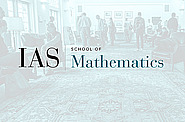Seminars Sorted by Series
Special Members’ Seminar
Dec
13
2010
Special Members’ Seminar
Uniform Well-Posedness and Inviscid Limit for the Benjamin-Ono-Burgers Equation
4:15pm|S-101
Oct
14
2013
Special Members’ Seminar
Oct
14
2013
Special Mini-Course in Geometric PDE
Mar
09
2009
Special Mini-Course in Geometric PDE
Dirichlet Duality and the Nonlinear Dirichlet Problem Part I: For domains in R^n; Part II: On Riemannian Manifolds
H. Blaine Lawson, Jr.
3:30pm|S-101
Special Number Theory Afternoon
Apr
21
2023
Special Number Theory Afternoon
Counting Irreducible Integral Polynomials with Roots Approximating Configuration of Points
2:30pm|Simonyi 101 and Remote Access
Apr
21
2023
Special Number Theory Afternoon
Murmurations of Arithmetic L-functions
Andrew Sutherland
4:00pm|Simonyi 101 and Remote Access
Special Number Theory Seminar
Mar
30
2012
Apr
10
2013
Special Number Theory Seminar
Solvability in Polynomials of Pell Equations in a Pencil and a Conjecture of Pink
2:00pm|S-101
Mar
25
2014
Apr
01
2014
Special Number Theory Seminar
Statistical behavior of eigenforms on quaternion algebras
Paul Nelson
3:30pm|Fine 1201, Princeton University
Apr
08
2014
Special Number Theory Seminar
L-functions, sieves and the Tate Shafarevich group
3:30pm|Fine 1201, Princeton University
Jun
10
2014
Special Number Theory Seminar
Euler systems and the Birch-Swinnerton-Dyer conjecture
Sarah Zerbes
3:00pm|Fine 314, Princeton University
Jun
11
2014
Special Number Theory Seminar
Euler systems and bounds for Selmer groups
David Loeffler
3:00pm|Fine 314, Princeton University
Apr
06
2022
Special Number Theory Seminar
On the distribution of the Hodge locus
Emmanuel Ullmo
3:00pm|Simonyi Hall 101
Apr
05
2024
Special Number Theory Seminar
Expansion, Divisibility and Parity
Harald Helfgott
4:00pm|Simonyi 101 and Remote Access
Special Probability Seminar
May
10
2018
Special Probability Seminar
Percolation of sign clusters for the Gaussian free field I
Pierre-Francois Rodriguez
2:00pm|Simonyi Hall 101
May
11
2018
Special Probability Seminar
Percolation of sign clusters for the Gaussian free field II
Pierre-Francois Rodriguez
2:00pm|Simonyi Hall 101
Special Program Learning Seminar
Sep
21
2022
Special Program Learning Seminar
Time Change for Unipotent Flows and Rigidity
11:00am|Simonyi Hall 101 and Remote Access
Special Representation Theory Seminar
Mar
08
2017
Mar
08
2017
Special Representation Theory Seminar
On the role of rank in representation theory of the classical groups
Roger Howe
2:35pm
Special Seminar
Oct
01
2004
Feb
28
2005
Oct
07
2005
Oct
25
2005
Special Seminar
Nonuniformly Hyperbolic Attractors; Invertible and Noninvertible
M. Benedicks
3:15pm|S-101
Apr
19
2006
Special Seminar
Huygens' Principle and Hyperplane Configurations
A. P. Veselov
2:15pm|Fine Hall 314, Princeton University
Apr
04
2007
Special Seminar
Some Results in Differential Cohomology
Jim Simons, Renaissance Technologies
2:00pm|S-101
Feb
01
2008
Special Seminar
From Automorphic Sheaves to the Cohomology of the Moduli Spaces of F-Bundles
10:30am|S-101
Feb
08
2008
Feb
15
2008
Feb
22
2008
Feb
29
2008
Mar
11
2008
Mar
17
2008
Special Seminar
Kazhdan-Lusztig Equivalence Between Quantum Groups and Affine Algebras Via Factorizable Sheaves
10:30am|S-101
Mar
21
2008
Mar
28
2008
Apr
01
2008
Special Seminar
Opers with Irregular Singularities and Spectra of the Quantum Shift of Argument Subalgebra
2:00pm|S-101

